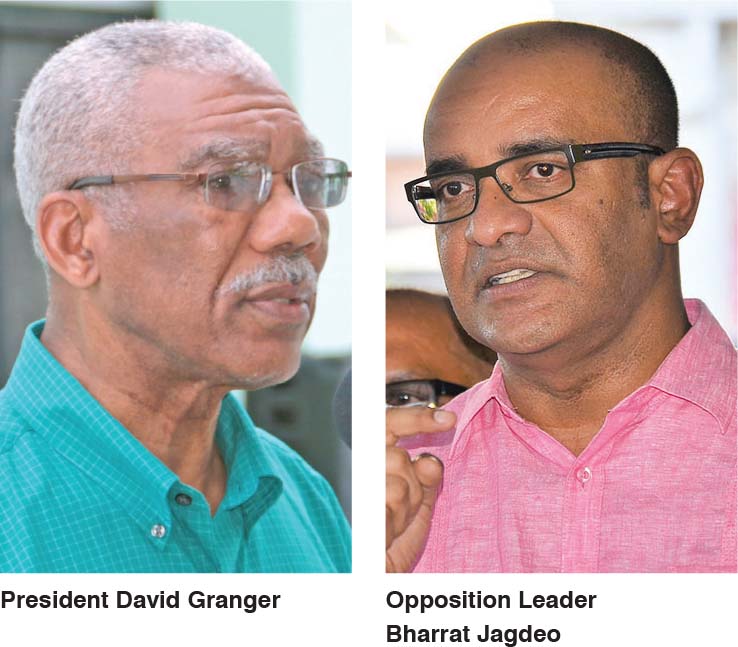GECOM chairmanship
As the back and forth continues on the nominations for Guyana Elections Commission (GECOM) chairmanship, President David Granger has pledged to put an end to the breach of the Constitution, which saw persons without the qualifications of a Judge being appointed to the position.
Speaking with reporters on Wednesday, the Head of State pointed out that regardless of what obtained in the past, as current President of Guyana, it is his responsibility to ensure that the provisions of the Constitution will be followed.
He was at the time responding to Guyana Times when asked about his acceptance of a nomination for the GECOM chairmanship in 2000 by then Opposition Leader Hugh Desmond Hoyte without having the necessary qualifications of a Judge as required under the Constitution.
“My understanding is that at all material times, a member of the legal profession or several members of the legal profession were on the list but my acceptance of the nomination or my name being on the list does not necessarily mean that I must accept the six names which are submitted. So it doesn’t follow the law of what you would call the ‘non sequitur’ (a conclusion or statement that does not logically follow from the previous argument or statement). The point is, even if the Constitution had been breached or if a nomination had been made in breach of the Constitution 10 or 20 years ago, there is no need to repeat it. That is not a precedent, I don’t accept that. I’m accepting now, as President, that the Constitution provisions must be applied,” the President stated.
Following the receipt of a letter from Opposition Leader Bharrat Jagdeo seeking clarification on his interpretation of the Constitution’s requirements for the nominees of GECOM chairmanship, President Granger said he has already responded to the Opposition Leader and will continue to engage him on the matter.
The Head of State further posited that the issue is now being looked at within a legal framework, not within the framework of politics or personalities.
“This is a constitutional matter and I’ve cited the Constitution to (Jagdeo). I’m not playing politics, I’m serious about the appointment of Chairman of GECOM and the Constitution is very clear. Mr Jagdeo did write to me and he asked for some clarification,” the Head of State said.
He added, “Well as I said, it has now gone into the legal zone and we are going to ensure that he gets the legal clarification that he needs but in terms of names, I’m not in the business of naming names at this stage. I’m in the business of satisfying the constitutional requirement for the appointment so that is as much as I can say at this stage. The law will prevail and we will continue to engage the Leader of the Opposition as required under the Constitution. So I’ve not disengaged (him), I’ve examined his letter and a response will be sent.”
In response to the President’s rejection of his first list of nominees and his consequent request for a second one, Jagdeo on Tuesday wrote the Head of State requesting an urgent meeting while asking that he elucidate his interpretation of Article 161 of the Constitution of Guyana, which deals with the requirements of the nominees to be submitted by the Opposition Leader.
The six nominees submitted by the Opposition Leader in December last year were retired Major General Norman McLean; Attorney and Political Analyst, Christopher Ram; former Chairman of the Private Sector Commission, Ramesh Dookhoo; Peace and Governance Consultant, Lawrence Lachmansingh; businesswoman, Rhyaan Shah; and Professor James Rose, none of whom President Granger noted has the qualifications of a Judge as required by the law.
The Head of State had outlined that the Constitution requires only persons who are Judges, qualified to be Judges, or former Judges of either a court having unlimited jurisdiction in civil and criminal matters or a court having jurisdiction in appeals from any such court.
However, Jagdeo pointed out that his interpretation of the Constitution is that the requirements go beyond the qualifications of a Judge.
“I am obliged to inform Your Excellency that my interpretation of Article 161(2) is different, in so far as, it also provides for, in addition to the category of persons to whom you have referred, “or any other fit and proper person,” Jagdeo penned in his January 10, 2017 letter to the President.
An extract of Article 161 reads, “Subject to the provision of paragraph (4), the Chairman of the Elections Commission shall be a person who holds or who has held office as a Judge of a court having unlimited jurisdiction in civil and criminal matters in some part of the Commonwealth or a court having jurisdiction in appeals from any such court or who is qualified to be appointed as any such Judge, or any other fit and proper person, to be appointed by the President from a list of six persons, not unacceptable to the President, submitted by the Leader of the Opposition after meaningful consultation with the non-governmental political parties represented in the National Assembly”.
